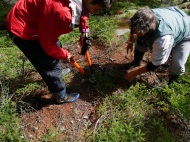Our campers left this morning, ending their time on Hog Island as part of National Audubon’s Seabird Restoration Program. It was a week packed with activities, workshops and lectures, and one that reminded us that when you’re working in the field, the weather always plays an unpredictable role.
The Seabird Biology and Conservation Camp is hosted every summer on Hog Island to support Audubon’s Seabird Restoration Program. In concert with Road Scholar, it’s a way for adults to support imperative conservation efforts that are succeeding in bringing native seabirds back to breeding colonies they once thrived in. (Learn why seabirds disappeared from these colonies and why Audubon is working to bring them back here.)
(Scroll down for more)
The week promises hands-on learning and service, from removing invasive plant species from seabird nesting grounds, to painting various seabird decoys to be used in restoration programs around the world, to building bird blinds for ornithologists to track data on seabird colonies.
This week was no different, our eager campers participated in service projects and enjoyed time to explore Hog Island, which itself is a magical and enchanted place.
Due to weather, our plans for landing on outlier islands remained uncertain most of the week. With small craft advisories, 4-7 and 5-8-foot swells, and wind gusts up to 30 knots, we could not risk the safety of our campers or staff and we chose not to land on these islands after all. We did land on the protected Harbor Island and completed beach clean-up and trail restoration there. Our other activities (listed above), though limited to the mainland or Hog Island, provided much needed assistance to the Seabird Conservation and Restoration Program.
Peppered throughout the service work, we offered lectures to our campers on the origins of Hog Island and Project Puffin (now the Restoration Program), bird migration, plankton and its role in the food chain, monarch butterflies and their migration patterns, plastic pollution and how to be smart, eco-friendly consumers. I gave a presentation on Antarctica, then showed my short film on the Adelie penguin and how it’s being affected by climate change.
This weekend I’ll be venturing out to a few islands to help the permanent staff here with invasive plant removal, breakdown of facilities for winter, marine debris removal, and some pie eating. Stay tuned for more!









One Reply to “”